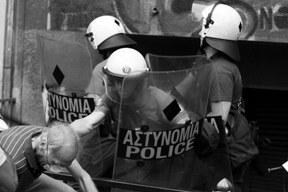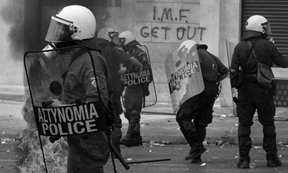Austerity, Policing, and Profit: Is Greece a Glimpse at Europe’s Future?

Photos by Georgios Giannopoulos
 “If I saw you sitting there a few years ago, I’d be afraid of you. Maybe more than you would be of me. We’re told you all carry knives and will throw molotovs at us. It’s all changed since I moved out here, the brainwash has worn off”. These words were marked in a friend’s travel journal, spoken to him by a security guard in the Greek Embassy of a Middle Eastern country (not named here, to spare both parties possible trouble). My friend had long hair and a beard. For this 30-something guard who’d previously served in the infamous riot control units in Athens, he was the embodiment of what was (to the aforementioned guard) “the enemy”, the anarchist, the troublemaker.
“If I saw you sitting there a few years ago, I’d be afraid of you. Maybe more than you would be of me. We’re told you all carry knives and will throw molotovs at us. It’s all changed since I moved out here, the brainwash has worn off”. These words were marked in a friend’s travel journal, spoken to him by a security guard in the Greek Embassy of a Middle Eastern country (not named here, to spare both parties possible trouble). My friend had long hair and a beard. For this 30-something guard who’d previously served in the infamous riot control units in Athens, he was the embodiment of what was (to the aforementioned guard) “the enemy”, the anarchist, the troublemaker.
The guard had a good deal more to say; about the way his superiors spoke to him, inspiring the idea that he and his colleagues were above the citizen they were tasked with protecting, for instance. His comments serve as a backdrop to any meaningful discussion of policing and its increasing militarization. A scenario in which living, breathing human beings are shaped by the conditions of their work environments, like the rest of us, and are desensitized to those conditions, again, just like the rest of us.
There’s an irony in the fact that I’m writing this from Exarchia, a bohemian, ever-rebellious neighborhood in downtown Athens that has at least two squads of riot police and groups of DELTA (1) (urban rapid intervention units) permanently stationed within it at all times. The joke goes “Exarchia is the only neighborhood in the western world occupied by a foreign force”. Right outside the house from which I’m writing, two rather large 20-something aged men in full body armor, carrying shields, tear-gas canisters and what appear to be Heckler & Koch MP5 submachine guns, are guarding a couple of trashcans and a broken-down moped that one of the neighbors abandoned a few days ago. They’re both twitchy. At any loud noise, they don their helmets as if an attack is imminent. Meanwhile, nothing is really moving under the midday sun.
The same picture repeats itself as one walks down toward the large avenues of central Athens. DELTA and DI.AS squads are stationed outside a parking lot, dark full body armor under the blazing sun, submachine guns hanging from their shoulders. Young faces. Some shaved heads, usually suggesting a supporter of the Greek neo-nazi party the Golden Dawn. After an anti-fascist demonstration in October 2012, it was this group that attacked anti-fascists in order to protect a group of Golden Dawn activists marching through a neighborhood where large and varied immigrant communities live. Fifteen people (2) were arrested that night and later reported that they were tortured in custody, with a forensic report backing their claims.
Then Minister of Citizens Protection, Nikos Dendias, made a valiant effort to defend his forces and insisted not only that he believed in the Greek police but would also equip them with better and heavier weaponry to deal with “armed thugs”. It was merely the icing on the cake, in a long process that has seen the Greek police go from lightly equipped constables at the beginning of the last century, to machine-gun-toting youngsters in riot gear. So why was a minister promising more equipment and, as a side note, better pay?
It should be noted that under the two memorandums of understanding between Greece and its lenders (the International Monetary Fund, the European Central Bank and the European Union, collectively known as the Troika) only two sections of Greece’s budget were spared the brutal cuts mandated: defense and policing. While the Greek army is a topic perhaps too complex to explore here, beholden to massive contracts between Greece and some of its lenders (3) for the purchase of largely unneeded military equipment, the police are another matter.
Throughout Europe, as in Greece, there’s a common narrative unfolding, wherein police are increasingly used to defend governments and property against grievances born out of financial policies. This includes not just public finances, but highly prized private investments in ailing countries like Greece. In Spain for instance, riot police are used to evict people who can’t afford mortgages, after a highly unregulated banking sector sent the Spanish economy up in flames in 2009. Resistance from activists has been substantial, and has been met by police in full gear wielding tear-gas and even plastic bullets in some cases. In Greece, heavily-outfitted police have even been dispensed in rural areas to crack down on dissent against the opening of a gold mine (4) that would see a significant chunk of the ancient Skouries forest in northern Greece destroyed. The recently ousted coalition government indicated that this private acquisition of public resources would move forward no matter what and government officials repeatedly visited the area to reassert their commitment to the project.
It was also revealed that the police working in the area of Skouries had been receiving outside material assistance, in the form of fuel and technical equipment supplied by the mining company Hellenic Gold (a subsidiary of the Canadian El Dorado). The cost of dispensing riot police in the area had reportedly been as high as 1 million. The officers deployed were entitled to additional pay for overtime and for operating outside their station/city. The strain placed on their ranks lead their union to report the excessive overtime they were called to take up in defense of a private company. In an official statement, union leaders said that police were placed in harm’s way for non-state affairs.
This draws into relief something that might help explain the level of violence unleashed during demonstrations in Greece and other countries under austerity. Overtime has become a way for individual police officers to supplement their income. Demonstrations and other events that might keep officers out in the streets beyond their usual shifts, unlock access to the seemingly bottomless sums of money available for overtime. The likelihood of their being called out for future demonstrations (for instance, against police violence in previous protests) might even function to incentivize police provocations that could endanger citizens, as well as the officers themselves. This is, of course, one of the factors invoked in the constant demand for more and heavier equipment. This is especially the case with regard to police guarding private investments. To cover the cost of overtime and other “extras”, then Greek Prime Minister Antonis Samaras approved a 7 million emergency increase (5) in the police budget for the Spring of 2014.
In the same way that the US saw an increasing militarization of its police force after 9/11, with equipment and advanced training becoming sources of funding increases for small departments, and with banks stepping in as sponsors, leading to the use of police officers as private enforcers for evictions and confiscations of property, the new “austerity Europe” is pushing its police forces away from consensus policing and into the murky territory of policy enforcement. The bid to use water cannons in London (6), by the city’s mayor Boris Johnson, for instance, is illustrative. An unnecessary measure, it indicates the mayor’s and the Metropolitan Police’s intentions to escalate the levels of conflict in the streets. With increasing pressure mounting around housing, underemployment, the complete destruction of the National Healthcare System and the increasing debt burdens of students and millennials, the targets of this escalation are becoming ever more self-evident.
In cases such as the demonstrations the UK saw in 2011 against university tuition hikes, no political resolution was ever proposed. The policy was a single-minded proposal that went through without much discussion, and dissent was met with police violence. It has become necessary for police to be the barrier between the political class and any objection. There is no room to speak of, for consensus.
This could prove determinative in the ideological constitution of the police, moving forward. And it raises questions as to how far the state will go to crack down on dissent. After the torching of a worksite in Skouries (7), the Greek state employed blanket surveillance to charge more than fifty people with forming a criminal organization, according to one of the activists involved. The cost of running such a surveillance operation is unknown for now. It looks like tactical expertise obtained through a decade of “war on terror” is now being used against Europe’s own citizens, much as is the case in the US.
It shouldn’t be altogether surprising that this combination of financial precarity and heavy training/equipment is transforming police departments around Europe into something more like mercenary forces, unaccountable to the citizens they’re charged to protect. There is very little point in taking this up with police themselves. There are root causes here, well beneath the particular institution of the police, across Europe. Even the British police, once proud of their civic character, seem to be headed down this path, with the aptly named Total Policing, which they define as “A total war on crime, total care for victims, and total professionalism from our staff”.
 This seems to be a self-conscious policy around the Western world, with use of the word “war” becoming pervasive. In response, some voices in Britain are already calling for the abolition of the London Metropolitan Police, increasingly regarded as an irredeemable institution. Such a call doesn’t ring as extreme as it might’ve in years prior, and it’s one now slowly echoing throughout the EU. There’s good reason to suspect that what is happening in the South of Europe foreshadows what is to come for the north. An honest examination lays bare the financial incentives behind this drive, and the prospect of donor-driven policing, as we’ve seen in the US. Meanwhile, the drive to police dissent against private entities (as in Southern Europe), is as terrifying as ever.
This seems to be a self-conscious policy around the Western world, with use of the word “war” becoming pervasive. In response, some voices in Britain are already calling for the abolition of the London Metropolitan Police, increasingly regarded as an irredeemable institution. Such a call doesn’t ring as extreme as it might’ve in years prior, and it’s one now slowly echoing throughout the EU. There’s good reason to suspect that what is happening in the South of Europe foreshadows what is to come for the north. An honest examination lays bare the financial incentives behind this drive, and the prospect of donor-driven policing, as we’ve seen in the US. Meanwhile, the drive to police dissent against private entities (as in Southern Europe), is as terrifying as ever.
FOOTNOTES
1 https://www.youtube.com/watch?v=_Jk6pooNckI
2 http://www.theguardian.com/world/2012/oct/09/ greek-antifascist-protesters-torture-police
3 http://www.theguardian.com/world/2012/apr/19/ greece-military-spending-debt-crisis
4 http://www.vice.com/en_uk/read/ skouries-forest-goldmine-greece
7 http://antigoldgr.org/en/2013/02/19/the-arson-attack-on- the-skouries-mining-site-and-its-aftermath/
Photos licensed under CC BY-SA 3.0. Georgios Giannopoulos can be found online at http://commons.wikimedia.org/wiki/ User:Ggia/Profile
